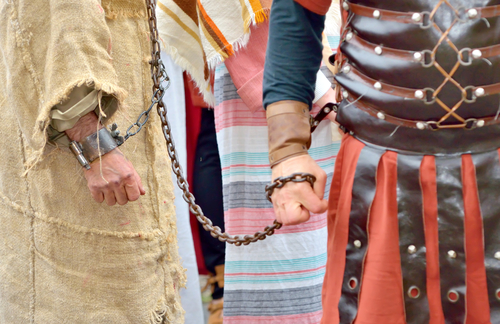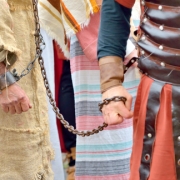The Ambassador in Chains
And for me, that utterance may be given to me, that I may open my mouth boldly to make known the mystery of the gospel, for which I am an ambassador in chains; that in it I may speak boldly, as I ought to speak. (Ephesians 6:19-20)
At the end of Paul’s great letter to the large Christian community in Ephesus, he asked for prayer. After telling them to take up the whole armor of God and to pray (Ephesians 6:10-18), then Paul specifically asked for prayer. His request was personal, asking they pray that God would give him utterance to preach, and to preach boldly. This means that we can battle in the spirit for others, not only for ourselves. If the Ephesians could do it for Paul, then we can and should do it for others.

The idea behind utterance is clear speaking. Added to boldly, Paul asked for prayer that he might proclaim the gospel both clearly and with a fearless power. It is easy to neglect one or the other. Preachers need more clarity in their preaching today. It’s easy to get lost in small details, side issues, and speculations. Clear preaching is a gift to both the church and the world, and preachers need prayer for clear speaking (utterance). When this clarity is combined with boldness, great things happen.
When Paul asked his readers to pray for the grace to be a clear, bold preacher of God’s truth, he probably had in mind his upcoming defense before Caesar. When Jesus first called and rescued Paul, God told him he would preach to kings (Acts 9:15). Another opportunity to do that was coming soon, and Paul needed and wanted the prayer support of fellow believers.
Paul might have asked for other things, such as relief from his imprisonment or other comforts. But his heart and mind were fixed on his responsibility as God’s ambassador.
Think about Paul’s wonderful self-description: an ambassador in chains. Of course, the ancient word used here for chains usually meant a prisoner’s shackles. At times, Paul wore the iron bands around his wrists and carried the chain that held him to the prison.
But that ancient word we translate chains could also be used for the gold adornment worn around the neck and wrists of the wealthy and powerful. On special occasions, ambassadors wore such chains to show the riches, power, and dignity of the government they represented.
Which sense did Paul mean when he called himself an ambassador in chains? I think he meant it in both senses! Paul looked at his prisoner’s chains and considered them to be the glorious adornment of an ambassador of Jesus Christ.
In Jesus Christ, what the world uses with the intention of shaming and binding the believer may be transformed to something glorious. It was true for Paul; it can be true for you today. Acknowledge the chains, but don’t focus on them: you real identity is to be God’s ambassador.
Click here for David’s commentary on Ephesians 6


